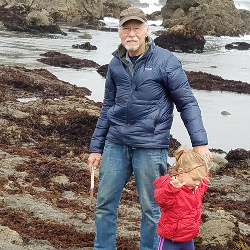 Why would an “In Memoriam” be in an issue about hope?
Why would an “In Memoriam” be in an issue about hope?
Tom was an engineer. He believed in structure and discipline. His life was filled with examples of what such a life could bring to his family and friends and those who had the fortune to spend time with him.
He wasn’t a writer per se, but Tom’s articles that appear in previous issues of Sisyphus are inspired by Tom searching for an absolute truth. Hopefully they inspired others to thoughtfully ponder and continue the conversations started in the articles; maybe encourage a would-be author to reach out.
He was micro-dosing when he had his first stroke and his guide asked, “What do you see?”
“It’s beautiful. Amazing. Truly amazing,” he replied, enraptured by what he witnessed. “I’ve got tell Charles about it.”
Tom wasn’t just a colleague and friend, he was also a co-grandparent. I never found out what he wanted to tell me. I am sharing the following letter to Tom because a Buddhist nun at the memorial considered this a teaching letter. And what is writing but personal passion shared freely with a reader, in hopes for universal conversation? One can only hope, at some deeper level, that Tom’s passing was his response at finding an absolute truth that was beautiful and that he was at peace with his discovery.
The song below is “Life, Grace, Trust” by Kate Munger, performed by the Threshold Singers of West Wales.– Ed.
Dear Tom,
We’ve talked many a time about Buddhist ideas, about how the stories we tell about who we are, are just stories. There is no self. You maintained mindfulness is a secular form of Buddhism, and how one needs to let go of one’s obsessions/fixations/attachments. More than that, you proposed, “this ‘goal-less’ goal is a form of awakening that yields ‘living in the world but not entangl[ing] with it.’”
I am finding focus difficult to do tonight with you in your coma after two massive strokes. You had a stroke. It looked like you were going to survive it. Then you had a second stroke that wiped out what you had remaining from the first stroke. Now the Tom I knew is lost in a forever coma that will take him down. Why does this happen? Why am I not prepared to deal with it?
Tom, I have addressed this letter to you starting before you passed on, but now that you have passed, I think, “Who should I address it to now?” You are not in this world. You are not anywhere. So now I think about what it means to be dead. Maybe we return to the beginning of all life. Most of us take all of this for granted, how all life participates becoming our world, this amazing planet we live on, how it can be lost.
It’s startling to think you are not here on this planet, that your loud bellowing laughter won’t be ringing through the hallway. That your generosity and kindness toward everyone are now memories. When blindness progressed and I couldn’t drive to meet you for lunch, you volunteered to drive me and you to the restaurant. Because I am immunosuppressed, when COVID struck, you volunteered to pick up sandwiches and come to my house. You never failed to be at my side, bringing me a plate of food, letting me take your arm to walk from one place to another, talking with me when I felt washed ashore and isolated. You lent your tools to your son-in-law and crawled under the house with him to investigate plumbing problems. You, at 80 years old, helped him to figure out how the electricity works in an induction stove.
I think about how you said you got up every morning and meditated an hour before breakfast. It reminds me how much your practice influenced your behavior and your relationship to me and our discussions. From a Buddhist perspective it is a matter of viewing the world through the lens of compassion, recognizing the interconnectedness of the world, you said. We are bereft of time affluence, you noticed. Economic growth is antithetical to environmental health. You and I used to get together and discuss this kind of Buddhism.
I miss you, Tom. I miss your Buddhist training which carried you and me into a place there was no self, only invented stories. Yours is perhaps one of the brightest.
I believe these thoughts of yours will live on in the friendships you have established, in the sense of peace and goodwill that you spread before us like a prepared meal, concepts and understanding that will exemplify one of your favorite sayings, “Pain is unavoidable, but suffering is optional.” Tom, you join with all of us together in our memories.
–Love, Charles
Leave a Reply